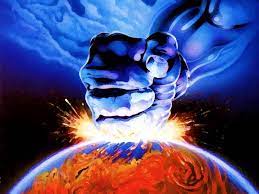The LORD Is Angry With All Nations
34: 1-4
The LORD is angry with all nations DIG: Why is the Lord angry with all the nations (see 10:5-15 for the example of Assyria)? What modern political and military leaders does that example bring to mind? What is Isaiah’s purpose in describing this in such graphic detail?
REFLECT: How would you explain God’s justice to someone if there were no prospect of judgment? How is His wrath related to His love? What does it mean to you that God will fight this hard in order to save you? How do you feel about God after reading this passage? How might you feel if you read it from the viewpoint of an oppressed person reflecting on the fact that justice would one day justice would be reversed ?
Isaiah announces the destruction of all the nations in the far eschatological future at the end of the Great Tribulation (63:1-6). Notice in these first four verses the universality of what is happening. Then it will suddenly become localized for reasons we shall see shortly. There is a universal call to all nations and to the entire earth. He invites them to hear the announcement He is about to make. But they are not being called to be witnesses, but to be sentenced.
Come near, you nations, and listen; pay attention, you peoples! Let the earth hear, and all that is in the world, and all that comes out of it (34:1). The word for earth here is not the Hebrew word that means the globe, but the word that means the inhabited earth. The emphasis is on the humanity of the earth gathered together. The reason for the universal call is for all these nations to gather together for Armageddon. It will not be a battle, but an execution.
For the LORD is angry with all the nations; His wrath is upon all their armies (34:2a). His anger is a righteous anger. If ADONAI was not a holy God and He did not punish sin, there would be no need for salvation (Romans 1:16-18). His grace must ultimately culminate in a decision. The sinner cannot continue to reject the sacrifice of the cross forever. The blood of the Messiah was too great a price. Hence, to reject the Sacrifice, is to become the sacrifice.

These verses describe the results of God’s judgment against all the nations. First, the emphasis is on the totality of the destruction. He will totally destroy them (34:2b). The Hebrew word totally destroy here and devoted to destruction in Joshua 7:12 means cherem. Whatever is cherem is untouchable, because it is devoted to destruction. Whenever God pronounces something as cherem, no one can touch or save any part of it. The contents of Jericho were to be given to the Lord as the firstfruits of the Land. When Achan took a beautiful robe from Babylonia, two hundred shekels of silver and a wedge of gold weighing fifty shekels, he became cherem. As a result, he, his sons and daughters, his cattle, donkeys, and sheep were all stoned to death, and then he was burned, with his tent and all he had. Why? When he touched that which was cherem, then he himself became devoted to destruction.
All these nations that have been gathered together are now under the cherem judgment of God and devoted to destruction. He will give them over to slaughter. Their slain will be thrown out, their dead bodies will send up a stench. Added to the shame of defeat and slaughter is the shame of exposure of the dead. The rotting corpses will be bobbing up and down in their own blood. In fact, there will be so much blood in the Valley of Jehoshaphat that it will come up to the horses’ bridle (see my commentary on Revelation, to see link click Ex – The Eight Stage Campaign of Armageddon) and all the birds will gorge themselves on their flesh (Rev 19:21). The blood from this slaughter heavily colors Chapter 34. The mountains and the land are soaked or drenched with their blood (34:2c-3). Even the sword of the Lord is bathed in blood (35:6).118
Secondly, we learn that all the stars of the heavens will be dissolved, literally decayed or rotted, and the sky rolled up like a scroll (34:4a) because sin had also polluted the heavens (Job 15:15; Hebrews 9:23; Revelation 6:13). The catastrophic events in the sky will accompany Messiah’s return to the earth to establish His Millennial reign (Joel 2:10 and 30-31, 3:15; Zechariah 14:6-7; Matthew 24:29). All the starry host will fall like withered leaves from the vine, like shriveled figs from the fig tree (34:4b). The harvest-time will have come and it will be time for reaping.
As a result, the day of the Lord will come like a thief. The heavens will disappear with a roar; the elements will be destroyed by fire, and the earth and everything in it will be laid bare. . . we are looking forward to a new heaven and a new earth, the home of righteousness (Second Peter 3: 10 and 13).
In Chapters 13 to 35 Isaiah sought to answer these questions: Can God deliver Israel from those who would harm her? Can He be trusted? Or is He just one more god, added to all the others? Is God Lord over all the nations? Is God’s counsel and wisdom superior to human leaders? But here in Chapters 34-35, the specific question that all of us ultimately have to answer is this, “Do I trust God, or the world (First John 2:15-17)?”



Leave A Comment